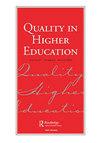The change of disciplinary practices as an effect of peer review in re-accreditation: the case of humanities in Croatia
IF 1.5
Q3 EDUCATION & EDUCATIONAL RESEARCH
引用次数: 2
Abstract
ABSTRACT The efforts in establishing quality assurance schemes in Croatia have faced a relatively new task of evaluating their effect on multiple levels. The effects of institutional compliance with European and national quality assurance framework and introduction of higher education management approach tools for internal quality assurance are noticeable in the compliance parts of the re-accreditation reports. In contrast, analysis of open parts of re-accreditation reports in humanities has shown unexpected results. The reviewer teams’ recommendations are addressing positive disciplinary practices characteristic of the humanities and suggesting the improvements targeting the modifications of practices related to the cultural-cognitive aspect of academic discipline. Content analysis results outline that reviewers have detected institutional strengths related to teaching which correspond with traditional cultural-cognitive practices in humanities (soft-pure sciences) contrastively, recommendations for improvement are mostly related to research practices, which demonstrate characteristics of hard sciences.学科实践的变化对重新认证的同行审查的影响:克罗地亚人文学科的案例
在克罗地亚建立质量保证计划的努力面临着一个相对较新的任务,即评估其在多个层面上的影响。在重新认证报告的合规部分,机构遵守欧洲和国家质量保证框架以及为内部质量保证引入高等教育管理方法工具的影响是显而易见的。相比之下,对人文学科再认证报告开放部分的分析显示出意想不到的结果。审查小组的建议涉及人文学科的积极学科实践特征,并建议针对与学术学科的文化认知方面有关的实践的修改进行改进。内容分析结果概述了审稿人已经发现了与教学相关的制度优势,这些优势与人文学科(软纯科学)的传统文化认知实践相对应,而改进建议主要与研究实践相关,这些研究实践展示了硬科学的特征。
本文章由计算机程序翻译,如有差异,请以英文原文为准。
求助全文
约1分钟内获得全文
求助全文
来源期刊

Quality in Higher Education
EDUCATION & EDUCATIONAL RESEARCH-
CiteScore
3.30
自引率
14.30%
发文量
32
期刊介绍:
Quality in Higher Education is aimed at those interested in the theory, practice and policies relating to the control, management and improvement of quality in higher education. The journal is receptive to critical, phenomenological as well as positivistic studies. The journal would like to publish more studies that use hermeneutic, semiotic, ethnographic or dialectical research as well as the more traditional studies based on quantitative surveys and in-depth interviews and focus groups. Papers that have empirical research content are particularly welcome. The editor especially wishes to encourage papers on: reported research results, especially where these assess the impact of quality assurance systems, procedures and methodologies; theoretical analyses of quality and quality initiatives in higher education; comparative evaluation and international aspects of practice and policy with a view to identifying transportable methods, systems and good practice; quality assurance and standards monitoring of transnational higher education; the nature and impact and student feedback; improvements in learning and teaching that impact on quality and standards; links between quality assurance and employability; evaluations of the impact of quality procedures at national level, backed up by research evidence.
 求助内容:
求助内容: 应助结果提醒方式:
应助结果提醒方式:


